Ask the Childbirth Educator: Continuous Support During Labour


My partner and I are expecting our first baby in a couple of months. The other day my mum rang me and said that she was so excited about being there with me at the birth. I was really stunned and didn’t know what to say to her. I love my mum, but never in a million years would I want her there during my labour! I know I have to tell her something, but how do I tell her without hurting her feelings?
Louise, Vic
The benefits of continuous support in labour have been well-documented in many studies.
In today’s busy maternity units, nurses, midwives, and doctors often are not able to provide continuous labour support to one woman in labour.
If you have continuous support in labour, you increase your chances of having a vaginal birth, you are less likely to use pain medication, and you will be less likely to have negative feelings about your birth experience.
Having said that though, who you have for that continuous labour support is critical. If you feel strongly that your mum is not the right person to have with you during your labour; then trust your instincts. Although it will likely be uncomfortable and awkward to have to tell your mum that you don’t want her at your birth, it is very important that you do tell her.
You might like to consider hiring a professional doula. A doula is an experienced labour companion who provides the woman and her partner both emotional and physical support throughout the entire labour and delivery. Some doulas are also trained in postpartum support and can be invaluable in the days and weeks after your baby is born.
Your doula will work with you and your partner to help you have the kind of birth you want. She will support you in your decisions about pain medication. If you tell your doula that you want to give birth without medication, she will help you do this. After the birth, a doula usually stays with you for 1 to 2 hours to help you with breastfeeding.
Doulas are not trained to perform any medical or nursing tasks and should never offer medical advice. However, they should help you understand medical events. They also can encourage you to communicate your preferences to the hospital staff. If your labour takes a different path than expected, a doula can help you make clear your feelings and review your options.
One of the most important roles of the doula is to help you to have positive memories of your birth experience. After the birth, you will remember together the positive aspects of the birth, and she will answer any questions you may have. If the birth does not go as you planned, your doula will be there to listen to you and to offer you support.
If you are interested in having a doula, then perhaps explain this to your mum. Generally, hospitals only allow two support people with you, so if you have your partner and a doula, your mum might be less hurt knowing the hospital wouldn’t allow a third person there. It might be a little bit of a white lie, but it could also save her from feeling hurt.
Perhaps you could suggest to your mum that she helps you to organise a baby welcoming party. This can be a lovely alternative to a baby shower.
Good luck!
Tanya Strusberg is a Lamaze Certified Childbirth Educator (LCCE) and teaches prenatal education to pregnant women and their partners in Melbourne.
She and her husband Doron have two beautiful children, Liev and Amalia.
To learn more visit www.birthwellbirthright.com
Facebook: https://www.facebook.com/birthwellbirthright










